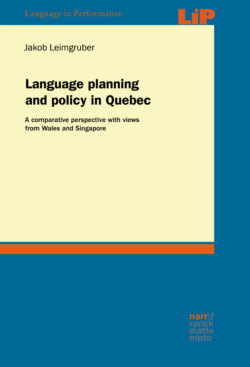Читать книгу Language planning and policy in Quebec - Jakob Leimgruber - Страница 9
На сайте Литреса книга снята с продажи.
1.1 The relevance of Quebec for language planning and policy research
ОглавлениеResearch into the LPP of Quebec and its larger Canadian context has a long history. Beginning with the British conquest of 1760, questions arose as to the status of the French settlers and their language, being now challenged by those of the new English power. An overview of the historical background that these initial decades represent is given in section 2.1. While the Quebec Act 1774 settled the thorny issue of religion, it is the British North America Act 1867 that put the two languages, French and English, on an equal legal footing in the parliaments of both Canada and Quebec. Neither of these acts did much, however, to address the socio-economic stratification that would emerge, over time, in the province of Quebec, that put English speakers at the top of the economic ladder, concentrating power and financial and political capital among a comparatively small anglophone élite, while the masses of the working class were overwhelmingly francophone. It is in the decades of the 1960s and 1970s that resentment at this situation grew and that legislation was passed to address the issue. Among early assessments of the language policy developments in Quebec are Mallea (1977), Wardhaug (1983), Bourhis (1984), Levine (1989), Levine (1990), followed by, among many others, Locher (1988), Daoust (1990), Landry and Bourhis (1997), MacMillan (1998). The turn of the millennium did not diminish the interest of scholars in the LPP of Quebec, as testified by the works of MacMillan (2011), Martel and Pâquet (2012) and Kircher (2016), even Boberg (2010), more concerned with structural linguistic issues in Canada as a whole, devotes some time to the LPP of the province. The policies in place in Quebec have also informed research on LPP as a whole: case studies appear for instance in Beer and Jacob (1985), Spolsky (2004), and Grin and Vaillancourt (2015). Among Quebec’s policies that have had an impact in the field are those aimed at making French an attractive language among the workforce (informing economic approaches to LPP, see e.g. Grin 1996; Grin 2006; Gazzola and Wickström 2016), those concerned with regulating the linguistic landscape, i.e. the visual side of language in public space (Landry and Bourhis, 1997; Backhaus, 2009; Dagenais et al., 2009), language commodification and postnational approaches to LPP (Heller, 2010; Heller et al., 2015), and the interplay between language, nation, and citizenship (Oakes and Warren, 2007; Heller, 2011; May, 2012), to name but a few.
It should also be noted that the policy approaches in Quebec have had an impact not only on Canada itself, shaping in many ways the interaction between the federal government and the provinces and territories, but also on other polities seeking to implement their own language policy. It is certainly no accident, for instance, that the wording of parts of the language legislation in Wales parallels that of Quebec’s Charter of the French language, adapted to the local specificities of Welsh and English in the country (see section 6.2 for a discussion). Similarly, language legislators in Catalonia closely scrutinised the efforts undertaken in Quebec (Reniu i Tresserras, 2002), as did those in the Baltic states (Druviete, 2002; Rannut, 2002) and Puerto Rico (Muñiz-Argüelles 2002; see Dumas 2002 for an overview of the global impact of Quebec’s LPP).
Quebec, therefore, has had an impact on both LPP practice and LPP research. As a result, the province and its legal framework provides an interesting benchmark against which to compare other polities’ policy approaches. An early study to do so is Thomas (1977), in which language movements (at that time in their formative stages) and nationalisms in Wales, Ireland, and Quebec are compared. Others, such as Backhaus (2009), have focussed on the legislation of the linguistic landscape (i.e., visible language in public space), and compared, in Backhaus’ case, Quebec with Tōkyō. In the present study, the policies in Quebec are compared with those found in Wales and in Singapore. The reasons for this choice of polities, explained in more detail in section 6.1, are found in the presence, in all three, of a population of native speakers of English of varying proportions, in the presence of languages that government policy-makers deem worthy of promotion, and, more generally, in the existence of a sophisticated LPP framework in all three polities, operating, of course, at different levels within each society, and enforced and policed with varying degrees of force. All three policy frameworks are couched within larger national discourses, whose obvious differences gloss over underlying similarities. These will, in due time, be made explicit in chapter 7.
